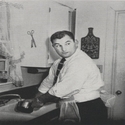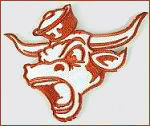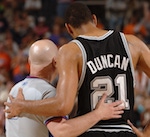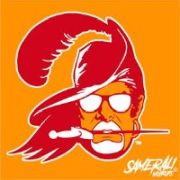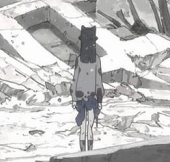|
Ron Jeremy posted:I like the concept of fantasy, but I would never put myself in a position where I would be rooting for the pats or the broncos for the sake of my fantasy team. Then don't draft a Patriot or a Bronco. v
|
|
|
|

|
| # ? May 14, 2024 03:35 |
|
What does the phrase "standard down" mean?
|
|
|
|
CobwebMustardseed posted:What does the phrase "standard down" mean? In what context? On the face of it, it would seem to apply to the usual downs used to advance the ball down the field, as opposed to the untimed downs for extra points.
|
|
|
|
Deteriorata posted:In what context? On the face of it, it would seem to apply to the usual downs used to advance the ball down the field, as opposed to the untimed downs for extra points. I was reading a breakdown of the Rose Bowl and it said that Stanford's offense does not play well on standard downs. That article posted:Get used to second-and-long. The stereotype for both of these offenses is probably something in the neighborhood of "run on first and second down, throw a safe pass on third down, punt away safely on fourth down."
|
|
|
|
CobwebMustardseed posted:I was reading a breakdown of the Rose Bowl and it said that Stanford's offense does not play well on standard downs. Ah, he's using it in the sense of "non-urgent" downs, where there is not a necessity to gain a lot of yardage in a hurry, like 3rd and long. He essentially means downs when the playbook is wide open and the choice for what play to run is unconstrained. Both teams prefer to run the ball and only pass when it seems necessary, and do not do a lot of tricks or fakes. His point in the middle paragraph is that both teams are actually pretty good at passing when they want to be and either or both might open the game up more to try to surprise the other. Football Outsiders, where the stat comes from, says this about it: quote:Passing Downs are defined as:
|
|
|
|
Would they still consider like 1st and 20 a standard down, then?
|
|
|
|
Deteriorata posted:Ah, he's using it in the sense of "non-urgent" downs, where there is not a necessity to gain a lot of yardage in a hurry, like 3rd and long. He essentially means downs when the playbook is wide open and the choice for what play to run is unconstrained. Okay, that makes sense. Thanks for clearing it up for me.
|
|
|
|
Trin Tragula posted:Would they still consider like 1st and 20 a standard down, then? I would. The gameplan is different in a 1st and 20 vs. a 1st and ten. In a 1st and 20 your goal is to get it to something like 2nd and 8 as opposed to making a 2nd and short.
|
|
|
|
Can someone explain the different punt formations, specifically the difference between college and nfl formations? I'm college it seems pretty common to have two or three extra blockers in front of the punter, not do much in the nfl. Is the o line just better in the nfl? Why the extra protection for the punter?
|
|
|
|
Ron Jeremy posted:Can someone explain the different punt formations, specifically the difference between college and nfl formations? I'm college it seems pretty common to have two or three extra blockers in front of the punter, not do much in the nfl. Is the o line just better in the nfl? Why the extra protection for the punter? So this doesn't 100% answer your question, but it is relevant. In college ball you will see more formations than in the NFL in every phase of the game. It isn't uncommon for teams to use very wide picket fence formations, and also punters who always punt on the run rugby style. Just another expression of the more varied schemes you see in NCAA ball as opposed to NFL. As for your questions I would suspect that in the NCAA people go for the punt block more regularly than they do in the NFL. I know that my team, VT, was know for blocking kicks for a while, but once we started getting more dangerous return guys you would see the rushers break off once they knew it wasn't a fake to try and set up blocks. Nothing here is based on anything, other than some random conjecture by me.
|
|
|
|
I've wondered about that a lot too and I don't have a better answer that drunk leprechaun's guess. Although it does seem easier for those three backed up protectors to shift to one side if you're doing one of those rugby style kicks without having to give any indication that's happening pre-snap. As I understand it those help mask a weak leg so the NFL hasn't bothered to mess around with them much.
|
|
|
|
Here's a reason why NFL teams don't use shield punt: one of the major advantages it gives you is the ability to release players downfield into coverage a lot quicker and make the returner's life more difficult, because not everyone is trying to hold their blocks until the kick. You're looking for a couple of linemen to just chip a rusher and then get away into coverage, it doesn't matter about those couple of guys getting through the line because the shield deals with them, and that then lets your punter kick the ball deeper because you can get in the returner's face easier and force him to fair catch or let the ball go. It's also easier to cope with overload rushes because the shield can see them coming, in the meantime you've just had 3-4 unopposed guys who can haul it downfield, and as long as your snapper puts the ball in the right place the punter's almost certainly got just enough time to get the ball away. This doesn't fly in the NFL because they have a rule that only the two ends are allowed to go downfield before the kick crosses the neutral zone, so you might as well just put everyone in tight and hold their blocks, and then they're up at the line when the kick goes over their heads and don't have 10 yards to make up before they can get somewhere to be useful. (A similar rule difference is why you see a lot more screen concepts in NCAA playbooks, and is basically why quick bubble and jailbreak screens were invented there: you can't have ineligibles downfield or pass interference unless a forward pass crosses the neutral zone. This allows you to have your linemen and spare receivers way past the neutral zone making people hurt by the time the pass is being caught, as long as that pass gets caught at or behind the neutral zone. In the NFL, those rules don't exist, so if you just stole a bunch of NCAA screen plays then you'll soon find that between ineligibles downfield and OPI you're drawing about six flags per play.)
|
|
|
|
Trin Tragula posted:Here's a reason why NFL teams don't use shield punt: one of the major advantages it gives you is the ability to release players downfield into coverage a lot quicker and make the returner's life more difficult, because not everyone is trying to hold their blocks until the kick. You're looking for a couple of linemen to just chip a rusher and then get away into coverage, it doesn't matter about those couple of guys getting through the line because the shield deals with them, and that then lets your punter kick the ball deeper because you can get in the returner's face easier and force him to fair catch or let the ball go. It's also easier to cope with overload rushes because the shield can see them coming, in the meantime you've just had 3-4 unopposed guys who can haul it downfield, and as long as your snapper puts the ball in the right place the punter's almost certainly got just enough time to get the ball away. Interestingly, I was just reading about this tonight. I've got the ebook version of "Anatomy of a Game: Football, the Rules and the Men Who Made the Game" by David Nelson and just passed a section on this very rule. To quote Nelson: quote:Hall also addressed in his annual report for 1928 the Rules Committee's concern that the punt return, one of the game's most spectacular plays, was dramatically decreasing in numbers. It was becoming common practice for punt receivers to allow punts to strike the ground because a muffed kick could be recovered and advanced by the kicking team, possible because the receiving team had few players in position to prevent a touchdown. This procedure was robbing football of one of its traditional plays. Under the new rule the kicking team was permitted to recover a kick but prohibited from advancing it. The Rules Committee chairman boasted, "We have seen in the past season more and better catching and running back of punts than for several years"(11). So no advancing of muffed catches came in 1928 because returners were too isolated and the risk was too great so they were letting them roll to a stop rather than risk giving up an easy touchdown. Ends only downfield early to cover kicks was tried in 1968 in college, but it made returns too easy at their level and covering returns was too much of a headache. The NFL then picked it up in 1974 and stuck with it to make punt returns a more important part of the game.
|
|
|
|
Wife asked a question last night and I realized I might not really know the answer. What exactly is accomplished in a huddle that can't be accomplished without it? She is a newcomer who is used to seeing no-huddle offense and expressed the thought that teams who huddle must not know their plays as well as the teams who don't. I said that a no-huddle offense must necessarily be working with a smaller playbook, and she took that as a statement that she was right. That is, the players in a huddle discuss what everyone will do on the next play because they don't have every play down pat in their heads. Is that right? Is it just a matter of having a smaller playbook that everyone knows vs a larger, more complex playbook that requires players to be reminded of what they're supposed to do?
|
|
|
|
Thermos H Christ posted:Wife asked a question last night and I realized I might not really know the answer. What exactly is accomplished in a huddle that can't be accomplished without it? She is a newcomer who is used to seeing no-huddle offense and expressed the thought that teams who huddle must not know their plays as well as the teams who don't. I said that a no-huddle offense must necessarily be working with a smaller playbook, and she took that as a statement that she was right. That is, the players in a huddle discuss what everyone will do on the next play because they don't have every play down pat in their heads. Intuitively I'd think you're taking a definite hit to communication running without a huddle, but I'm not really in a position to speak with any authority.
|
|
|
|
Thermos H Christ posted:Wife asked a question last night and I realized I might not really know the answer. What exactly is accomplished in a huddle that can't be accomplished without it? She is a newcomer who is used to seeing no-huddle offense and expressed the thought that teams who huddle must not know their plays as well as the teams who don't. I said that a no-huddle offense must necessarily be working with a smaller playbook, and she took that as a statement that she was right. That is, the players in a huddle discuss what everyone will do on the next play because they don't have every play down pat in their heads. Talking to your teammates without the defense hearing. Ideally in a no huddle they won't understand what you're saying, but that won't last the whole game. Just look at Super Bowl 37 for how much information leaks can affect a game, even when the defense isn't directly getting the calls.
|
|
|
|
When you huddle you have 11 pairs of ears in very close proximity, and whoever's calling the play can call it using the name in the playbook. If anyone doesn't hear right, they can ask; if anyone isn't sure of their assignment they can ask, and it doesn't hold you up more than a couple of seconds (if that's going to put you in play clock trouble then there are probably other things you can speed up). To call a play no-huddle someone needs to use hand signals (and that applies whether or not you have a helmet radio) to communicate; they can be stolen, and it's another thing for all the players to remember that two hands on head + two hands on waist + potato hands translates to "I doubles right 32 sweep". Even if everyone has wristbands you're still adding some extra level of complexity to your play-calling process, and because all the players are spread out, they can't necessarily ask someone what the assignments are - and even if they can, you still might not want to do that right in front of the defense where they can see and hear you. So it's not necessarily an issue of playbook detail, but of a lot more potential ways to gently caress up your playcalling.
|
|
|
|
Is there a lot of useful information for the defense on the wristband the quarterbacks wear? Like if he got sacked, would the defense gain an advantage by getting a good look at what is on there?
|
|
|
|
SkunkDuster posted:Is there a lot of useful information for the defense on the wristband the quarterbacks wear? Like if he got sacked, would the defense gain an advantage by getting a good look at what is on there? Not really. The wristband is written in the coded language of offensive playmaking. When I played High school football, plays that were numbered were run plays while plays that were started with some certain color were pass plays(I forget what the first number meant, but the number in the tenths place meant some gap to go through - Red 38 was an off-tackle swing play. The guards pulled and the center blocked down). Basically, unless the defense knew what the numbering of the play was or what the color (or whatever scheme the offensive coordinator used), the wrist band wouldn't mean anything to them. There have been a few cases in the past where a team figured out what an opposing teams play calling was by figuring out what the hand signals the coach made from the sideline meant, but the NFL comes down viciously on that sort of intelligence gathering. so, tl:dr, no.
|
|
|
|
A White Guy posted:There have been a few cases in the past where a team figured out what an opposing teams play calling was by figuring out what the hand signals the coach made from the sideline meant, but the NFL comes down viciously on that sort of intelligence gathering. Is this really not allowed? I thought the reason for the clipboards in front of the face, and Chip Kelly's elaborate and ridiculous signs, were so that other teams didn't steal their signals.
|
|
|
|
von Metternich posted:Is this really not allowed? I thought the reason for the clipboards in front of the face, and Chip Kelly's elaborate and ridiculous signs, were so that other teams didn't steal their signals. Players are allowed to do it, but teams aren't allowed to videotape coaching staff/the sidelines to steal signs (and this is why practices are closed). If a player cracks your code, your code was probably too simple anyways. The reason for Kelly's signs is because the visual cue transmits information much faster than a verbal cue and there's no potential for miscommunication if you're receiving complex information.
|
|
|
|
Declan MacManus posted:Players are allowed to do it, but teams aren't allowed to videotape coaching staff/the sidelines to steal signs (and this is why practices are closed). If a player cracks your code, your code was probably too simple anyways. Unsurprisingly this happened to Penn State once and it turns out the result is hilarious. Turns out you win 6-4. If I remember right, at the time, plays would be transmitted by holding up what was basically a spiral bound notebook of laminated pages. Page color indicated what unit was supposed to be on the field and a large number on the sheet was the play. It would have a number like 24. But it was really 2-4, which meant formation #2 play #4. It was...pretty easy to figure out over time. Sash! fucked around with this message at 19:20 on Jan 5, 2014 |
|
|
|
So when teams don't make playoffs, or are eliminated in the playoffs, what do they do until it all starts over again next year? Is it grind as usual, are they gonna take it easier, is it going to be vacation... what?
|
|
|
|
Officially vacation or go home other than OTAs (a few practices sprinkled sometime after the draft) up until training camp. These days everyone tends to keep up their training to stay in shape at least and you'll hear about some guys getting together to do drills on their own or whatever. e: vv--oh yeah forgot about the minicamp Grittybeard fucked around with this message at 01:27 on Jan 6, 2014 |
|
|
|
pigdog posted:So when teams don't make playoffs, or are eliminated in the playoffs, what do they do until it all starts over again next year? Is it grind as usual, are they gonna take it easier, is it going to be vacation... what? They're off from the time their season ends usually until April when teams begin OTAs or Organized Team Activities. These usually last a few days to a week at a time in several intervals then they're off again until minicamp in May/June which also usually lasts a few days. The real training doesn't begin again until July when they go into training camp, from there its work non stop through the end of the season. OTAs and Minicamp are non-contact and its for stuff like learning the playbook, going over film, conditioning training, strength training and individual player drills.
|
|
|
|
http://www.grantland.com/ Here's a great site for pop-culture and sports. It's a little advanced for newbies, but once you get up to speed, I challenge you to find a source that is as accurate and well-written.
|
|
|
|
Pete Jones posted:http://www.grantland.com/ If you find an article you like, the writers almost invariably have their own website/full time gig you can check out.
|
|
|
|
Google is failing me and I don't have access to any stats databases, but are there more injuries in the playoffs? It sure seemed that way in the Colts-Chiefs game and Bengals-Chargers, dudes were dropping like flies. It seems like it would make sense given that everybody's already played 15 games and is now going 100% effort on every play.
|
|
|
|
Can punters influence the bounce of the ball? Like get it to stop dead or bounce deep if the returning team decides not to field it? With so many players switching teams every year, how do teams handle playbook security? I'm wondering if there are situations where a very important game is on the line and one of the players previously played for the opposition team if the coaches might look to them for information that would give them an edge.
|
|
|
|
Trevor Weedheart posted:Google is failing me and I don't have access to any stats databases, but are there more injuries in the playoffs? It sure seemed that way in the Colts-Chiefs game and Bengals-Chargers, dudes were dropping like flies. It seems like it would make sense given that everybody's already played 15 games and is now going 100% effort on every play. Those were 'flukes' most likely. There's generally a bunch of injuries early in the season, especially with the rule changes that limit contact during practices. I believe this year the NFL had a record number of ACL tears, but this could be completely bullshit. Guys are banged up late-season sure, but major injuries are generally not predictable and the likelihood of someone suffering a season-ending injury late in the season would either be random or a result of playing on a previously-hosed joint/muscle/whatever.
|
|
|
|
SkunkDuster posted:With so many players switching teams every year, how do teams handle playbook security? I'm wondering if there are situations where a very important game is on the line and one of the players previously played for the opposition team if the coaches might look to them for information that would give them an edge. Playbooks (or Play-iPads as they are now) are required to be turned in when a player leaves the team, and I'd guess the reason players abide those rules is so they don't get blackballed if/when they're found out to be deviously making copies for their future team like that. It does actually happen quite often that teams will sign players cut from other teams they are likely to face - especially from divisional opponents or possible playoff matchups. They obviously try to get whatever info they can, but how much more of a benefit that is over just watching tape is unclear.
|
|
|
|
Edit: eh, nevermind
xtrmntallhippies fucked around with this message at 08:00 on Jan 10, 2014 |
|
|
|
Going back to the NFL teams signing players cut from division rivals: I think the greatest value they could give is who is nursing which undisclosed injuries.
|
|
|
|
If a team has the ball on their own goal line, is there really any penalty for taking a delay of game penalty? As I understand it, it is 5 yards or half the distance.
|
|
|
|
SkunkDuster posted:If a team has the ball on their own goal line, is there really any penalty for taking a delay of game penalty? As I understand it, it is 5 yards or half the distance. No, but refs are empowered to take action on repeated fouls. If a team committed multiple fouls deliberately they could award a safety in that situation. Similarly, at the other end of the field a defense deliberately fouling repeatedly could be dealt with by awarding the touchdown to the offense.
|
|
|
|
Huh I had no idea that was the rule. Do you remember a time that happened? I always assumed it was like Zeno's Endzone.
|
|
|
|
Spoeank posted:Huh I had no idea that was the rule. Do you remember a time that happened? I always assumed it was like Zeno's Endzone. I don't know that it's ever been enforced (at least I've never heard of it) but it's in the NFL rules: Rule 12, Section 3 Unsportsmanlike Conduct quote:FOULS TO PREVENT SCORE
|
|
|
|
Spoeank posted:Huh I had no idea that was the rule. Do you remember a time that happened? I always assumed it was like Zeno's Endzone.
|
|
|
|
Spoeank posted:Huh I had no idea that was the rule. Do you remember a time that happened? I always assumed it was like Zeno's Endzone. As far as I know it's never been invoked; what you do is that after you get suspicious you go to the defensive captain and tell him that the rule exists, and then they mysteriously manage to stop offending - that definitely has happened a couple of times in NCAA 1-A football without anyone else noticing or the rule having to be used.
|
|
|
|

|
| # ? May 14, 2024 03:35 |
|
The Patriots just kicked off from the 50 due to a penalty on/after their conversion. I would imagine each NFL team gets to do this four or five times a season. Does any team ever try to just pop it up in that situation so it has to be fielded at about the 5-yard line and the returner is immediately tackled or has to fair-catch?
skaboomizzy fucked around with this message at 04:27 on Jan 12, 2014 |
|
|










